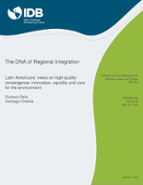The DNA of Regional Integration: Latin American's Views on High Quality Convergence Innovation Equality and Care for the Environment
Date
Oct 2016
EDITOR
Institute for the Integration of Latin America and the Caribbean (INTAL)
This report is the outcome of an Inter-American Development Bank (IDB)regional public good (RPG) that different Latin American and Caribbean
countries helped to create by identifying the information they needed to
perfect the decision-making process on matters of trade and integration.
The mechanism that the IDB foresaw is a three-way process, in which decisions are made in partnership with technical institutions and countries,
which share their experience and knowledge of social demands. In this
case, the countries of the region played a key role in designing an opinion
poll on trade and integration, the results of which we compare with national
statistical indicators. This was made possible by the strategic partnership
between the Institute for the Integration of Latin America and the Caribbean
(IDB/INTAL), part of the Integration and Trade Sector, and Latinobarómetro,
marking the start of the dialogue between two databases with very specific features. The first of these is the highly complete information on trade and integration that INTAL has acquired over its 51-year history. The second, the public perceptions that Latinobarómetro, a pioneering public opinion poll, has been measuring in the region for over two decades. Cross-referencing the results of over 20,000 exclusive surveys that were carried out in 18 Latin American countries with national statistics has helped create a powerful tool for designing integration and trade strategies. Comparing citizens' opinions and national statistics allows researchers to find correlations and asymmetries between public perceptions and the region's actual performance, thus contributing to improving planning and impact assessment in public policy design. We believe that integration processes should reflect both dimensions: they must not overlook classic indicators but they also need to include the voice of the people of Latin America, which is an essential part of any regional strategy seeking to construct a form of governance that is underpinned by the demands of society.
countries helped to create by identifying the information they needed to
perfect the decision-making process on matters of trade and integration.
The mechanism that the IDB foresaw is a three-way process, in which decisions are made in partnership with technical institutions and countries,
which share their experience and knowledge of social demands. In this
case, the countries of the region played a key role in designing an opinion
poll on trade and integration, the results of which we compare with national
statistical indicators. This was made possible by the strategic partnership
between the Institute for the Integration of Latin America and the Caribbean
(IDB/INTAL), part of the Integration and Trade Sector, and Latinobarómetro,
marking the start of the dialogue between two databases with very specific features. The first of these is the highly complete information on trade and integration that INTAL has acquired over its 51-year history. The second, the public perceptions that Latinobarómetro, a pioneering public opinion poll, has been measuring in the region for over two decades. Cross-referencing the results of over 20,000 exclusive surveys that were carried out in 18 Latin American countries with national statistics has helped create a powerful tool for designing integration and trade strategies. Comparing citizens' opinions and national statistics allows researchers to find correlations and asymmetries between public perceptions and the region's actual performance, thus contributing to improving planning and impact assessment in public policy design. We believe that integration processes should reflect both dimensions: they must not overlook classic indicators but they also need to include the voice of the people of Latin America, which is an essential part of any regional strategy seeking to construct a form of governance that is underpinned by the demands of society.




